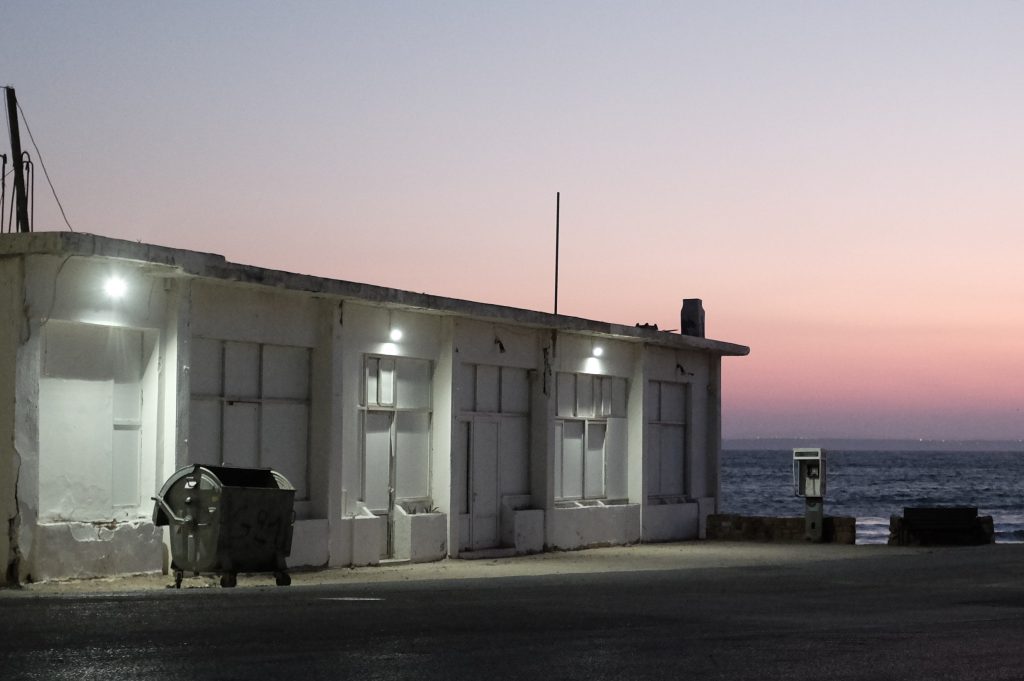refugees on the run
landing in karfas beach on the greek island of chios in the aegean sea on october 16th, 2019
16 children
8 women
11 men
a total of 35 people


transcription
the sun is slowly rising when we get the message about a landing in the bay of karfas. on our arrival, the dawn has broken. the sun shines in soft red. except for the continuous sound of the waves it is ghostly quiet. on the square that borders the beach there is a simple white building. people stand lined up silently in sparse neon light. mainly small children, women, and teenagers lean motionless against the building’s wall. some people are wrapped in rescue blankets sparkling silver and golden in the rising sun – a bizarre and disturbing sight.
a few armed policemen are standing in front of these people. my eyes wander along the building’s wall down to the sea, where a deflated rubber boat lies on the beach. car inner tubes drift in the surf. people wear them around their bodies during the crossing. many cannot swim. today nobody had a life jacket with them.
most of the people have wet pant legs. sand sticks to them. not everyone wears shoes. a young man hardly reacts when I press a bottle of water into his hand. an old man stands next to his wife. the fear in their eyes is hardly bearable. the old man looks at me silently but gratefully as I hand him a plastic bag with dry clothes. a young woman quietly vomits into a plastic bag. another young man holds out his baby to me. the baby is not crying, although it is half-naked and has large sores on its legs and buttocks. “help, can you help?” i shake my head. even the volunteers from the medical service, who have also arrived, cannot help the baby.
most likely, the desperate father does not yet know where the bus behind us will take his family. everyone is brought to a camp for registration. The camp is surrounded by garbage dump. it borders on a garbage compactor. under catastrophic hygienic conditions, most people spend many months in the camp, some even years. they live in thin tents on the surrounding fields. some sleep under plastic covers, others have no roof over their heads at all.
no one lives voluntarily in the camp. the camp is hopelessly overcrowded. it was designed for 1,000 people. in the meantime, however, they say it is over 5,000 people. the greek government does not publish exact figures. it does not want to turn the local population against the unwanted camp even more.
the bus driver is screaming franticly now. everyone has to get on the bus as fast as possible. luggage isn’t loaded. those who have a small backpack own more than the majority. most people just have what they carry on their bodies and the plastic bag with the dry clothes we just gave them. the bus leaves.
the car inner tubes are slowly drifting further into the open sea. we can still see them. the sun is rising. footprints in the sand along the wall are the only reminders of the landing on october 16th, 2019. soon winter will come accompanied by rain. these people’s traces will be blurred forever. their memory will remain while more people will follow. nothing can stop people who have to flee from war, hunger, or poverty – no fence, no sea, no weapons, no laws, no borders.
some 65 million people are currently fleeing worldwide. in our opinion, this is the result of exploitation and oppression that began with colonization several centuries ago. it is our behavior as inhabitants of the northern hemisphere that contributes to this forced migration.
on october 24th, 2019, we returned from greece where we worked for an ngo that helps refugees who are being left on their own because of politics and where state aid comes too late. people are welcomed by volunteers at the landing on the beach and are initially cared for. water, dry clothes, and warm blankets are handed out.